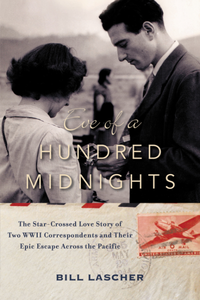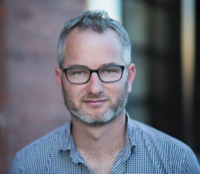 Bill Lascher's Eve of a Hundred Midnights is the unforgettable true story of two married journalists on an island-hopping run for their lives across the Pacific after the Fall of Manila during World War II. It has received starred reviews from both Kirkus and Booklist, who says, "Propulsive. … [A] remarkable book, which is part history, part a celebration of war correspondence, but, mostly, a love story. … Lascher conveys the privation, danger, and romance of this time in an utterly detailed and beguiling way.” To celebrate his book birthday today, the author has stopped by LLF to share his own personal connection to and love for libraries.
Bill Lascher's Eve of a Hundred Midnights is the unforgettable true story of two married journalists on an island-hopping run for their lives across the Pacific after the Fall of Manila during World War II. It has received starred reviews from both Kirkus and Booklist, who says, "Propulsive. … [A] remarkable book, which is part history, part a celebration of war correspondence, but, mostly, a love story. … Lascher conveys the privation, danger, and romance of this time in an utterly detailed and beguiling way.” To celebrate his book birthday today, the author has stopped by LLF to share his own personal connection to and love for libraries.
***
Writing Eve of a Hundred Midnights has been an exercise in treasure-hunting. I've mined the resources and expertise of university special collections, government archives, and my local public library (the Multnomah County Library in Portland, Oregon) to flesh out an already-fascinating story. But they offer more than inter-library loan agreements and extensive microfilm collections.
When I was a child, my parents ran a small appellate law practice in Downtown Ventura, California, a block uphill from the public E.P. Foster Library. If I wasn't imagining the overgrown lot that separated the office from the library as a jungle full of treasures, then I was at the library looking for books about pirates, ancient treasures and adventurous knights (another half block away was the Ventura Bookstore, where frequent visits with my parents developed my love for independent bookstores). But though The Library was a frequent destination, it would be years before I truly treasured libraries.
 I began to do so as a student at Oberlin College. Mudd, the school's alien spaceship of a library was the gravitational center around which all my college experiences seemed to orbit. I kept up with news on the the election of George W. Bush and the September 11 attacks in the library's print copies of the New York Times, the Cleveland Plain Dealer and the Elyria Chronicle-Telegram. On a wall by the main stairway, I found humor in the notes then-Library Director Ray English wrote to answer students' random questions. Every time I entered the stairwell, I cringed as I passed "Falling Man," the depressive Max Schumann painting that hung on the wall.
I began to do so as a student at Oberlin College. Mudd, the school's alien spaceship of a library was the gravitational center around which all my college experiences seemed to orbit. I kept up with news on the the election of George W. Bush and the September 11 attacks in the library's print copies of the New York Times, the Cleveland Plain Dealer and the Elyria Chronicle-Telegram. On a wall by the main stairway, I found humor in the notes then-Library Director Ray English wrote to answer students' random questions. Every time I entered the stairwell, I cringed as I passed "Falling Man," the depressive Max Schumann painting that hung on the wall.
Sometimes I descended to the subterranean "A-Level" to check out course reserves. There, I also read graffiti on dot matrix printer paper hung in bathroom stalls, checked email, and, more often than not, socialized in the busy lobby. At other times, I went upstairs to nap in a rainbow of colorful couches. Once or twice I joined a partner to hunt for a dark corner or empty study carrel where we could make out.
And yes, I even used the library to do research. But whenever I did, I found myself more interested in what I stumbled upon as I wandered the stacks. Looking for one book, my eyes would be drawn to another on the other end of the shelf, or on an aisle I'd mistakenly wandered down.
Intellectual side roads house the richest stories, and the best libraries facilitate such journeys. They are engines of intellectual pursuit, but also cultural and social engagement. We could sanctify libraries and venerate librarians and archivists as keepers of secular priesthoods, but I worry that characterizing libraries as untouchable spaces accessible only by academic-Shibboleth-uttering intellectuals distances the general population. Such distancing can be almost as damaging as the demonization and fear with which libraries are too often treated.
Instead of serving as secular temples, libraries belong alongside great bars, coffee shops and as necessary "third places" of society outside home and work that bring communities together.
Libraries do inspire in me the kind of awe I think others find in observatories, opera halls, or wilderness. A single institution's library and archival collection, let alone an entire modern nation's mesh of curated knowledge, can be staggering. One could by no means consume everything in a given collection, perhaps on a given bookcase, with any ease.
That's okay. I don't have the kind of discipline I'd need to focus on one subject and ignore the others, anyway. Any given library brims too fully with information collected for the sole purpose of understanding ourselves, our world, and our past—as well as for contemplating the potential futures we may face. The experience of discoveries not sought, sudden turns down informational back roads, and the rush of sentiment evoked when reading a letter perhaps not read since its receipt decades or centuries ago is too addictive. After all, perhaps all the stories in the world have been written. Perhaps the treasure we seek is just waiting in the next book on the shelf. Wouldn’t you want to share that discovery with the people wandering along with you?
***
Thanks, Bill! His captivating, true-life tale hits shelves today, so definitely check it out!
-Amanda
